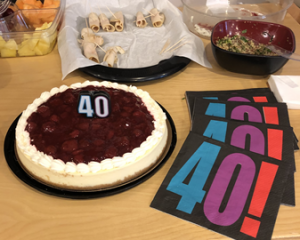
Presented to the April 5, 2019 CoAction Staff Association Annual Meeting
Welcome to CoAction’s 40th Anniversary Meeting.
CoAction was formed 40 years ago, in 1979, as a way for housing co-op staff to meet one another and talk about our work. Formal incorporation took place 9 years later in 1988. We are a democratically-run non-profit co-operative.
CoAction provides a community structure in which staff find support, knowledge and skills development through our social and educational events. We have 36 members.
Volunteers are the lifeblood of CoAction. Our thanks go out to all those who contributed their hard work this year, and to the many members who volunteered their time and passion over the last four decades. CoAction would not exist without its dedicated volunteers.
A special thank you goes to retiring director Gerri Pennie. Her continued commitment and energy has been of immeasurable benefit to us all. We wish her the very best.
And a big thank you goes out to our Executive Director, Brian Eng for his excellent guidance and support.
The Income Statement for 2018 shows a deficit of just over $500, the bulk of which was due to the one-time expense of website development. Aside from that expense, the organization came close to breaking even last year.
In 2018, board members were:
- Gerri Pennie, President
- Lana Nwaokoro, Vice President
- Karen Hurley, Treasurer
-
Denise Bezaire, Secretary
- Kent Price, Director
- Emily Wong, Director
- There was one vacancy
The board met nearly every month, receiving financial and other reports from our Executive Director, and planning educational and social events. The board conducted a member survey about how the organization could better serve its members. Seven new CoAction members were welcomed over the year.
CoAction’s domain name was changed from “.org” to “.ca” and a gmail account was set up. We launched our new website in 2018, with many thanks to Brian Eng for the beautiful web design.
A Website/Communications Committee was formed to provide content for the newsletter and website. Serving on the committee are Denise Bezaire (chair), Lana Nwaokoro, and Kent Price.
Our Executive Director, Brian Eng, moved to the west coast last summer. Working remotely, he continues to provide board support, keeps the website current, and publishes our electronic newsletter “CoAction News”. Brian attends board meetings by phone, sometimes aboard the ferry to the mainland. We understand he was outside in shorts for our March meeting.
With Brian out of town, directors are fulfilling local duties while the board considers what the best staff complement would be. Job descriptions are under development and we might begin the search for a second staff person in the coming months.
Two members’ meetings were held in 2018. A brief AGM was held in February, where by-law amendments passed and board elections took place, and an April GMM made further changes to the by-laws and approved a new simplified dues structure. A board review of the Organizational By-law is currently underway.
Also in 2018, Karen Hurley was appointed as CoAction’s representative on the CHFT board for a two-year term.
In keeping with CoAction’s commitment to the principles of co-operation, we occasionally collaborate on projects with the other three staff associations in Ontario: CASO (London area), CSACO (Kitchener/Waterloo area), and CHCHNA (Hamilton/Niagara area).
We have a joint website, theStaffNetwork.coop. And if you’ll be attending the CHF Canada conference in London this June, drop by the staff associations table to say hello. We’ll be there promoting CoAction with our new brochure.
CoAction delivered several educational events in 2018. Visit CoActionSA.ca for workshop materials.
In March CoAction and CHFT hosted a joint staff education day. Workshop choices were:
- Co-ops and e-Transactions
- Fifteen Favourite Messy Human Dramas
- Preventative Maintenance
- Preparing for Your Board Meeting
- Living Through Capital Projects
- How to Survive Working in a Co-op
CoAction presented a new workshop in May: Can We Ask That? Protecting Personal Privacy.
September’s full day event was called Accent on Accessibility:
- Your Co-op and the AODA (Accessibility for Ontarians with Disabilities Act)
- Planning for Accessibility – Asset Management Planning
Future Energy: A Workshop about Incentives and Other Possibilities was delivered in October.
We have a great educational program lined up for 2019.
In March we held a joint CoAction/CHFT Education Day. The workshops we offered were:
- Financial Management for Non-Financial Managers
-
Legal Issues Facing Staff
-
By-law Basics
- Writing Business Plans
- and there was a group discussion on working with volunteers.
This morning’s workshop was called: “There’s a New Board in Town”.
On May 10th we’ll bring back a popular workshop called Workplace Violence and Harassment.
CoAction is planning fall workshops on topics to interest maintenance and administrative staff alike. We are working on the following topics:
“Flooring Solutions” will examine and compare different types of flooring commonly found in co-ops and their pros, cons, and alternatives.
Sustainability is a topic we will address by looking at ways co-ops can encourage better participation in waste reduction, recycling programs, reduced car use and other topics that can lead to environmental sustainability.
Energy Reduction is another topic up for discussion with a look at specific programs and incentives such as lighting upgrades from Toronto Hydro.
And, we plan to offer First Aid / CPR training again.
Please give some thought to any gaps in your training that we could help fill with a workshop. Suggestions for new topics are always welcome.
We hope everyone is subscribed to our newsletter. You can sign up on our website at CoActionSA.ca.
Everyone is welcome to join us at the Pear Tree on Parliament Street after the meeting for a CoAction and Friends Social and help celebrate our 40 years.
In the meantime, let’s enjoy a slice of cherry cheesecake after the board elections.








